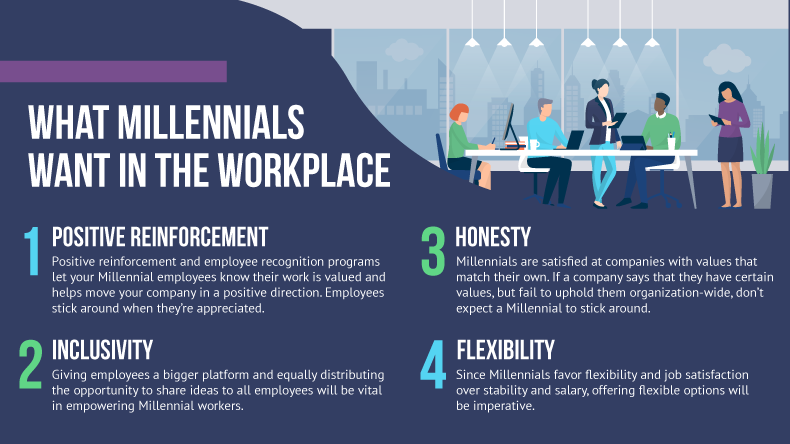Discover the secret behind the millennial work ethic revolutionizing industries and redefining success in our modern age.

Table of Contents
- Work Ethic of Millennials
- Values of Millennials in the Workplace
- Misconceptions and Challenges
- Strategies for Organizations to Tap into Millennials’ Work Ethics and Values
- Conclusion
Born between 1981 and 1996, millennials have become a dominant force in the modern workforce. With their fresh perspectives and digital savviness, understanding their work ethics and values is crucial for organizations to engage and retain this generation effectively. In this blog post, we will delve into Millennials’ work ethics and values, exploring their unique characteristics and the potential benefits they bring to the workplace.
Work Ethic of Millennials
Flexible work arrangements: One notable aspect of Millennials’ work ethic is their strong desire for work-life balance and flexible schedules. They crave the ability to manage their personal lives while pursuing their professional goals. This generation highly values remote work options and the ability to collaborate digitally, as it allows for greater freedom and control over their work-life integration.
Focus on meaningful work: Millennials significantly emphasise pursuing careers that align with their values and passions. They desire to make a meaningful impact in their work and are likelier to switch jobs if they feel their current role does not fulfil their aspirations. This characteristic brings a sense of purpose and dedication to their work, making them highly motivated and eager to contribute.
Emphasis on collaboration and teamwork: Millennials value working in diverse teams and actively seek collaboration opportunities. They are inclined towards open communication and idea-sharing in the workplace. This collaborative approach fosters innovation and creativity and enables them to contribute to collective progress and drive positive change within organizations.
Values of Millennials in the Workplace
Purpose-driven work: Millennials are increasingly drawn to organizations prioritising profitability and societal impact. They seek careers that allow them to make a difference and contribute to solving real-world problems. A strong social or environmental mission is a key factor in their decision-making when choosing where to work.
Work-life balance: Millennials prioritise their well-being and mental health, unlike previous generations. They actively seek employers who understand work-life harmony’s importance and support achieving this balance. This value reflects their desire to maintain a fulfilling personal life alongside a successful career, ultimately increasing their loyalty and productivity.
Technology and innovation: Having grown up in a digital era, Millennials are comfortable with technology and quickly adapt to new tools. They appreciate companies that embrace technology and promote digital transformation. Leveraging their tech-savvy nature can lead to enhanced productivity and efficiency within organizations.
Diversity and inclusion: Millennials place great importance on diversity and inclusion in the workplace. They value and advocate for a multicultural and inclusive environment, seeking out organizations that prioritize these aspects. They recognize the power of diverse perspectives, backgrounds, and ideas in driving innovation and strengthening teams.
Misconceptions and Challenges
Millennials have often been subjected to overgeneralizations and stereotypes despite their many positive qualities. Some believe they are lazy, entitled, or lacking a work ethic. These misconceptions can create barriers and hinder collaboration between generations in the workplace. It is essential to recognize that every individual is unique, and generalizations can oversimplify and misrepresent the true work ethic of Millennials.
Image courtesy of www.zenefits.com via Google Images
Moreover, clashes between the more traditional work environments and the innovative approaches of Millennials can present challenges. Adapting to their preferences for flexible work arrangements and technology-dependent workflows may require organizations to restructure certain work processes. Finding common ground and fostering collaboration with more experienced colleagues is key to bridging these gaps.
Additionally, dealing with Millennials’ expectations for quick career advancement and growth can be demanding for organizations. Many Millennials aspire for rapid career progression and development, and meeting these expectations can be challenging in a competitive job market. Striking a balance between providing growth opportunities and managing realistic expectations becomes crucial to attracting and retaining Millennial talent.
Strategies for Organizations to Tap into Millennials’ Work Ethics and Values
Organizations can leverage the unique work ethic and values of Millennials by implementing the following strategies:
1. Providing flexibility and remote work opportunities: Flexibility in work arrangements, including remote work options, can greatly appeal to Millennials. Offering flexible schedules and alternative work environments can enhance job satisfaction, productivity, and work-life balance for this generation.
2. Creating purpose-driven initiatives: Organizations should strive to align their values with those of Millennials. By emphasizing a strong social or environmental mission, companies can attract and retain Millennial talent passionate about making a difference in the world. This alignment fosters a sense of purpose and enhances employee engagement and loyalty.
3. Promoting diversity and inclusion efforts: Organizations should actively work towards creating an inclusive workplace culture where diverse perspectives are valued and celebrated. Providing equal opportunities and diverse representation appeals to Millennials and drives innovation and creativity.
4. Nurturing career development and growth opportunities: Millennials significantly emphasise continuous learning and development. Organizations should invest in comprehensive training programs, mentorship opportunities, and meaningful career trajectories that align with this generation’s aspirations. This approach promotes job satisfaction and ensures the retention of talented Millennials.
5. Encouraging open communication and collaboration channels: Establishing platforms for open communication and idea sharing is essential to cater to Millennials’ collaborative nature. Encouraging teamwork, mentorship, and cross-generational collaborations fosters a positive work environment and enhances productivity and creativity.
Conclusion
In conclusion, understanding and embracing Millennials’ work ethics and values is critical for organizations in the modern workforce. Their desire for flexibility, focus on meaningful work, emphasis on collaboration, and values around purpose, work-life balance, technology, and diversity bring unique opportunities for organizations to thrive. Organizations can attract and retain talented Millennials by tapping into their work ethic and creating an environment that aligns with their values, driving innovation and success.
